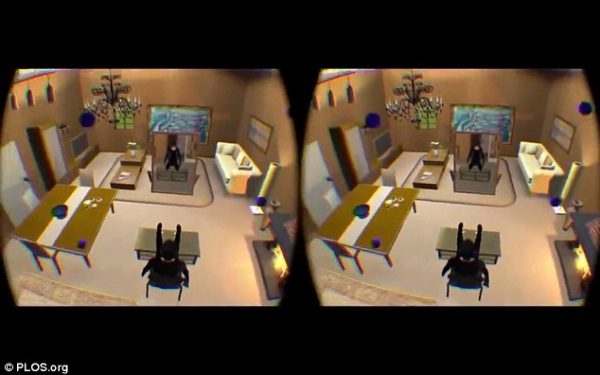It could be a helping hand for the terminally ill.

By Mark Prigg
[R]esearchers have revealed a virtual reality simulation that can help people comes to terms with death.
It teaches then how to become ‘disconnected’ from their physical bodies.
Mel Slater at the University of Barcelona, Spain, and his team used an Oculus VR headset on 32 patients.
‘Immersive virtual reality can be used to visually substitute a person’s real body by a life-sized virtual body (VB) that is seen from first person perspective,’ they wrote.
Researchers fool the volunteers into thinking the virtual body was their own.
While wearing a headset, the body would match any real movements the volunteers made.
They were also fitted with movement sensors and vibrating units on their hands and feet.
When a virtual ball was dropped onto the foot of the virtual body, a vibration was triggered on the person’s real foot.
Once they became ‘in sync’ with the virtual body, participants were then transported to a virtual living room in which they could move their legs and kick balls thrown at them from a distance.
Then, they were taken out of the body.
‘The viewpoint of the participant was lifted out of the virtual body towards the ceiling of the virtual room, and just behind the body, so that the body could be seen below,’ the team wrote.
‘When the viewpoint is lifted up and out of the VB so that it is seen below this may result in an out-of-body experience (OBE).’
‘Fear of death in the experimental group was found to be lower than in the control group.
‘This is in line with previous reports that naturally occurring OBEs are often associated with enhanced belief in life after death.
People who had felt totally disconnected from their body – and the virtual body – reported having a significantly lower fear of dying.
‘The effect was quite strong,’ Slater told New Scientist.
He hopes the experience might give a feeling that a person’s consciousness is separate from their physical body.
‘It gives a sense that it’s possible to survive beyond death,’ he says.
The virtual experience is similar to some kinds of near-death out-of-body experiences.
Some people who survive heart failure have described seeing the hospital room from the ceiling during critical moments, says Slater.
‘Our results open up the possibility that the virtual OBE experience provides an implicit learning that consciousness in the sense of the centre of perception can be separate from the physical body, and that therefore death of the physical body is not necessarily the end of consciousness,’ the researchers concluded.
Complete Article HERE!
